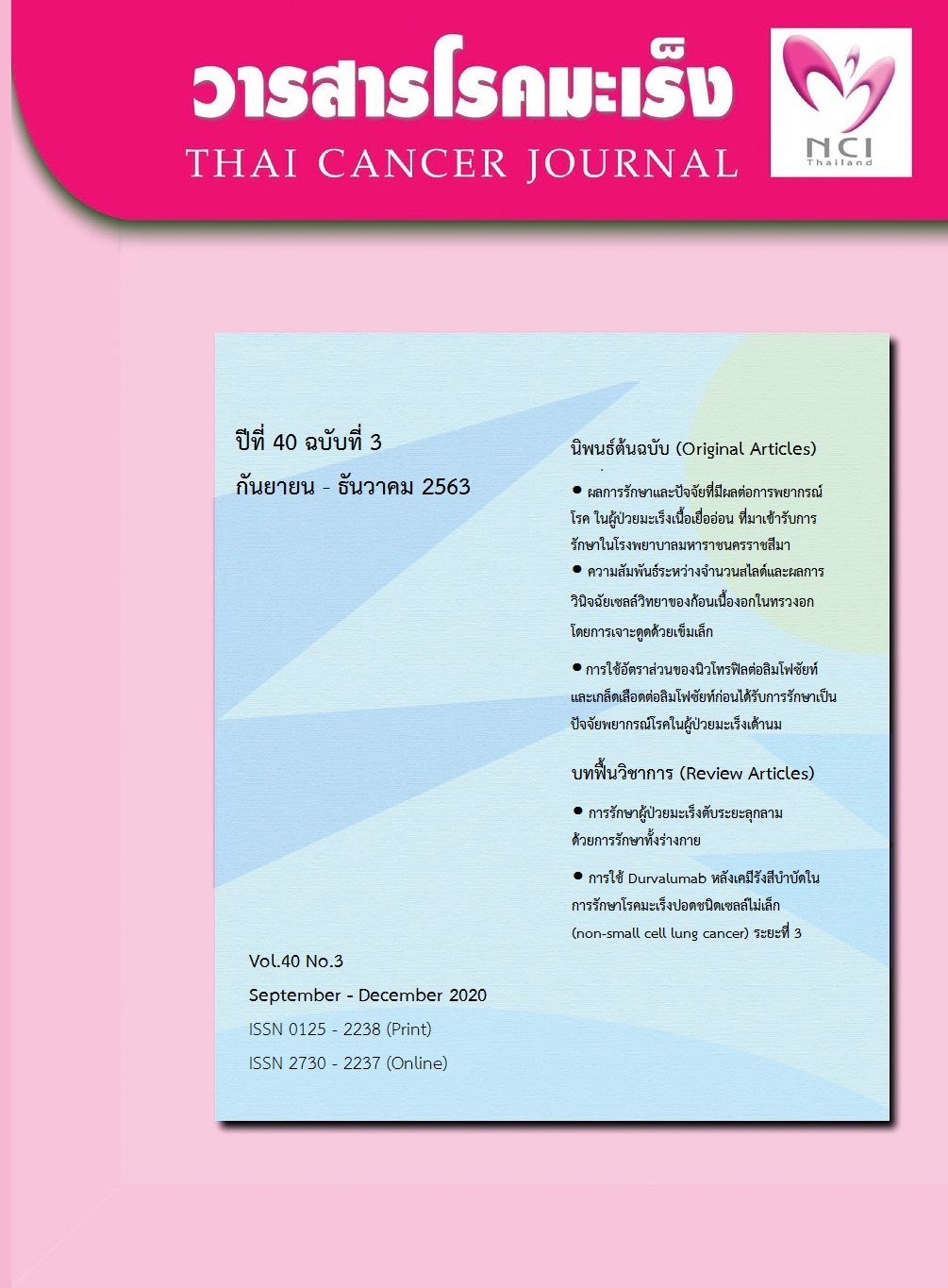Systemic Therapy in Advanced Hepatocellular Carcinoma
Keywords:
advanced hepatocellular carcinoma, systemic therapy, therapeutic drugsAbstract
Hepatocellular carcinoma (HCC) is a major global health problem and the most frequent primary liver tumor. Although there are widespread applications of cancer-screening systems to detect early-stage HCC, a significant proportion of patients are still diagnosed with non-resectable HCC. In Thailand, according to the Thai Association for the Study of the Liver, which is an improved version of Barcelona Clinic Liver Cancer (BCLC) staging, the advanced stage characterizes patients with cancer-related symptoms, macrovascular invasion (either segmental or main portal vein) or extrahepatic spread (lymph node involvement), or metastases. Untreated advanced-stage HCC had a poor prognosis, with a survival time of 6-8 months; survival at 1 year was 25%. There are currently many treatments for advanced HCC, one of which is systemic therapy. Sorafenib was the first molecular target agent with supportive evidence of survival benefits; it has now become the first line treatment for patients with advanced HCC. In the past few years, more agents have been approved by the USFDA for patients with advanced HCC. This article reviews the role of the currently approved systemic therapy for advanced HCC according to the National Comprehensive Cancer Network (NCCN) guidelines.
References
2. World Health Organization. Available at: https:// www.who.int/news-room/fact-sheets/detail/cancer. Accessed May 12, 2020.
3. Worldwide cancer research fund international. Available at https://www.wcrf.org/dietandcancer cancer trends/worldwide-cancer-data.
Accessed May12, 2020.
4. กองยุทธศาสตร์และแผนงาน สำนักงานปลัดกระทรวงสาธารณสุข. เข้าถึงได้จาก:http://bps.moph.go.th/ new_
bps/sites/default/files/statistic%2061.pdf. สืบค้นเมื่อวันที่ 12 พฤษภาคม 2563.
5.กาญจนา โชติเลอศักดิ์, บุรณี กาญจนถวัลย์, ชิษณุ พันธ์เจริญ, อุษา ทสิยากร, อดิศร ภัทราดูลย์, บรรณาธิการ. รู้ทันมะเร็งโรคที่ป้องกัน และรักษาได้.
กรุงเทพฯ: แลงเกวจเซ็นเตอร์ แอดเวอร์ทิสเมนท์; 2551.
6. ศิวนันท์ ฟองจันทร์, สุรีย์พันธุ์ วรพงศธร, พนัชกร ภวภูตานนท์ ณ มหาสารคาม, เกษม ชูรัตน์. การป้องกันและควบคุมมะเร็งตับ. วารสารโรคมะเร็ง 2562;39:65-74.
7. สำนักงานกองทุนสนับสนุนการสร้างเสริมสุขภาพ. เข้าถึงได้จาก:https://www.thaihealth.or.th/Content/ 16004-ฟันธงบุหรี่เป็นสาเหตุ%20 “มะเร็งตับ”.html. สืบค้นเมื่อวันที่ 13 พฤษภาคม 2563.
8. Hsu IC, Metcalf RA, Sun T, Welsh JA, Wang NJ, Harris CC. Mutational hotspot in the p53 gene in human hepatocellular carcinomas. Nature [serial online]. 1991; 350: 427-8. Available from: https://pubmed.ncbi.nlm.nih.gov/1849234/. Accessed May 13, 2020.
9. Hamed MA , Ali SA. Non-viral factors contributing to hepatocellular carcinoma. World J Hepatol [serial online]. 2013; 5(6): 311-322.
Available from: https:// www.ncbi.nlm.nih.gov/pmc/articles/PMC3692972/pdf WJH-5-311.pdf. Accessed May 13, 2020.
10. NCCN Clinical Practice Guidelines in Oncology (NCCN GUIDELINES) Hepatobiliary Cancers Version2.2020–May 8, 2020. Available at:
https://www.nccn.org/professionals/physician_gls/pdf/hepatobiliary.pdf. Accessed May 14, 2020.
11.Llovet JM, Ricci S, Mazzaferro V, Hilgard P, Gane E, Blanc JF, de Oliveira AC, et al. Sorafenib in advanced hepatocellular carcinoma. N Engl J Med [serial online].
2008;359(4):378–90. Available from: https://www.nejm.org/doi/10.1056/NEJMoa0708857?url_ver=Z39. 882003&rfr_id=ori:rid:crossref.org&rfr_dat=cr_pub% 20%200
www.ncbi.nlm.nih.gov. Accessed May 15, 2020.
12. Cheng AL, Kang YK, Chen Z, Tsao CJ, Qin S, Kim JS, et al. Efficacy and safety of sorafenib in patients in the Asia-Pacific region with advanced hepatocellular carcinoma:
a phase III randomised, double-blind, placebo-controlled trial. Lancet Oncol [serial online]. 2009;10:25–34.Available from: https://pubmed. ncbi.nlm.nih.gov/19095497/.
Accessed May 15, 2020.
13. U.S.FDA. FDA approves lenvatinib for unresectable hepatocellular carcinoma. Available at: https://www.fda.gov/drugs/
resources-information-approved-drugs/fda-approves-lenvatinib-unresectable-hepatocellular-carcinoma. Accessed May 16, 2020.
14. Kudo M, Finn RS, Qin S, Hyub Han K , Piscaglia F, Baron A, et al. Lenvatinib versus sorafenib in first-line treatment of patients with unresectable hepatocellular
carcinoma: a randomised phase 3 non-inferiority trial. Lancet 2018;391:1163-73.
15. Cheng AL, Qin S, Ikeda M, Galle P, Ducreux M, Zhu A, et al. LBA3 IMbrave150: Efficacy and safety results from a ph III study evaluating atezolizumab (atezo)+
bevacizumab (bev) vs sorafenib (Sor) as first treatment(tx) for patients (pts) with unresectable hepato cellular carcinoma (HCC). Ann Oncol. 2019; 30:ix186-7
Available from: https://www.sciencedirect.com/science/article/pii/S0923753419582072. Accessed May 17, 2020.
16. Finn RS, Qin S, Ikeda M, Galle P, Ducreux M, Kim T, et al. atezolizumab plus bevacizumab in unresectable hepatocellular carcinoma. N Engl J Med [serial online].
2020; 382: 1894-905. Available from: https://www.nejm.org/doi/full/10.1056/NEJMoa1915745. Accessed May 17, 2020.
17.Qin S, Bai Y, Lim HY, Thongprasert S, Chao Y, Fan J, et al. Randomized, multicenter, open-label study of oxaliplatin plus fluorouracil/leucovorin versus doxorubicin
as palliative chemotherapy in patients with advanced hepatocellular carcinoma from asia. J Clin Oncol 2013;31:3501-8.
18. U.S.FDA. Regorafenib. Available at: https://www.fda.gov/drugs/resources-information-approved drugs/regorafenib. Accessed May 18, 2020.
19. Bruix J, Qin S, Merle P, Granito A, Huang YH, Bodoky G, et al. Regorafenib for patients with hepatocellular carcinoma who progressed on sorafenib
treatment (RESORCE): a randomised, double-blind, placebo-controlled, phase 3 trial. Lancet 2017;389:56-66.
20. U.S.FDA. FDA approves cabozantinib for hepatocellular carcinoma. Available at: https://www.fda.gov/
drugs/fda-approves-cabozantinib-hepatocellularcarcinoma. Accessed May 19, 2020.
21. Abou-Alfa GK, Meyer T, Cheng AL, El-Khoueiry A.B, Rimassa L, Ryoo BY, et al. Cabozantinib in patients with advanced and progressing
hepatocellularcarcinoma.N Engl J Med 2018;379:54-63.
22.หน่วยคลังข้อมูลยา คณะเภสัชศาสตร์ มหาวิทยาลัยมหิดล. Ramucirumab (VEGFR2 monoclonal antibody) กับข้อบ่งใช้ใหม่สำหรับรักษาโรคมะเร็งตับ เข้าถึงได้จาก:
https://pharmacy.mahidol.ac.th/dic/news_week_full.php?id=1511. สืบค้นเมื่อวันที่ 20 พฤษภาคม 2563.
23. U.S.FDA. FDA approves ramucirumab for hepatocellularcarcinoma. Available at: https://www.fda.gov/drugs/
resources-information-approved-drugs/fda-approves-ramucirumab-hepatocellular-carcinoma. Accessed May 20, 2020.
24. Zhu AX, Kang YK, Yen CJ, Finn RS, Galle P, Llovet JM, et al. Ramucirumab after sorafenib in patients with advanced hepatocellular carcinoma and increased
Fetoprotein Concentrations (REACH-2): A Randomised, double-blind, placebo-controlled,phase3 trial. Lancet Oncol 2019;20:282-96.
25 U.S.FDA. FDA grants accelerated approval to nivolumab for HCC previously treated with sorafenib. Available at: https://www.fda.gov/drugs/resources-
information-approved-drugs/fda-grants-accelerated-approval-nivolumab-hcc-previously-treated-sorafenib. Accessed May 21, 2020.
26. El-Khoueiry AB, Sangro B, Yau T, Crocenzi TS, Kudo M, Hsu C, et al. Nivolumab in patients with advanced hepatocellular carcinoma (CheckMate 040): an open-
label, non-comparative, phase 1/2 dose escalation and expansion trial. Lancet 2017;389: 2492-502.
27.หน่วยคลังข้อมูลยา คณะเภสัชศาสตร์ มหาวิทยาลัยมหิดล.Immune checkpoint inhibitors (เช่น nivolumab, pembrolizumab, ipilimumab) อาจเสี่ยงต่อการเกิดปฏิกิริยาต่อต้าน
อวัยวะปลูกถ่าย (graft rejection). เข้าถึงได้จาก:https://pharmacy.mahidol.ac.th/dic/news_week_full.php?id= 1417.สืบค้นเมื่อวันที่ 22 พฤษภาคม 2563.
28. U.S.FDA. FDA Approves nivolumab/ipilimumab for pretreated patients with hepatocellular carcinoma. Available at: https://www.fda.gov/drugs/resources-
information-approved-drugs/fda-grants-accelerated-approval-nivolumab-and-ipilimumab-combination hepatocellularcarcinoma. Accessed May 22, 2020.
29. Keytruda® (pembrolizumab) [package insert]. Thailand, MSD;2016.
30. U.S.FDA. FDA grants accelerated approval to pembrolizumab for hepatocellular carcinoma. Available at:
https://www.fda.gov/drugs/fda-grants-accelerated approval-pembrolizumab-hepatocellular-carcinoma. Accessed May 23, 2020.
31. Zhu AX, Finn RS, Edeline J, Cattan S, Ogasawara S, Palmer D, et al; KEYNOTE-224 Investigators.Pembrolizumab
in patients with advanced hepatocellularcarcinoma previously treated with orafenib (KEYNOTE-224)
: a non-randomised, open-label phase 2 trial. Lancet Oncol 2018;19:940-52.
Downloads
Published
Issue
Section
License
บทความทีตีพิมพ์ในวารสารโรคมะเร็งนี้ถือว่าเป็นลิขสิทธิ์ของมูลนิธิสถาบันมะเร็งแห่งชาติ และผลงานวิชาการหรือวิจัยของคณะผู้เขียน ไม่ใช่ความคิดเห็นของบรรณาธิการหรือผู้จัดทํา







